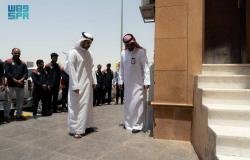Saudi Arabia Leads Middle East Virtual Reality Revolution with Record Investment and Innovation
The Kingdom of Saudi Arabia is experiencing a remarkable transformation in its virtual reality (VR) and digital technology landscape, positioning itself as the leading hub for immersive technologies in the Middle East and North Africa region. Recent market analysis reveals unprecedented growth trajectories driven by strategic government initiatives, substantial private sector investments, and a uniquely positioned demographic advantage.
Market Growth and Economic Impact
The Saudi Arabian virtual reality market is witnessing exponential expansion, with industry analysts projecting compound annual growth rates exceeding regional averages through 2030. This surge reflects the Kingdom's commitment to technological diversification as part of its ambitious Vision 2030 economic transformation program, which aims to reduce dependence on oil revenues while establishing the nation as a global technology powerhouse.
Investment in VR infrastructure has reached historic levels, with both government entities and private enterprises allocating substantial resources toward developing immersive technology ecosystems. Major technology parks in Riyadh, Jeddah, and emerging smart cities like NEOM are incorporating VR development centers, research facilities, and innovation hubs that attract international technology partners and local entrepreneurs alike.
Demographic Advantage Fuels Adoption
Saudi Arabia possesses a significant competitive advantage in VR market development: its exceptionally young and tech-savvy population. With approximately 70 percent of citizens under the age of 35, the Kingdom boasts one of the world's most digitally engaged demographics. This youth population demonstrates high adoption rates for emerging technologies, creating robust demand for VR applications across entertainment, education, professional training, and social interaction platforms.
Digital literacy rates continue climbing as the government invests heavily in STEM education and technology training programs. Universities and technical institutes are integrating VR development and application courses into their curricula, ensuring a steady pipeline of skilled professionals capable of driving continued innovation in the sector.
Sector-Specific Applications Transform Industries
Virtual reality technology is revolutionizing multiple economic sectors within the Kingdom. The entertainment and gaming industry represents the largest current market segment, with Saudi consumers demonstrating strong appetite for immersive gaming experiences, virtual concerts, and digital entertainment venues. Several Saudi-based gaming studios are developing VR titles specifically tailored to regional preferences and cultural contexts.
The education sector is experiencing profound transformation through VR adoption. Educational institutions are implementing virtual laboratories, historical reconstructions, and immersive learning environments that enhance student engagement and learning outcomes. Medical schools utilize VR simulations for surgical training, while engineering programs employ virtual environments for complex system design and testing.
Corporate training represents another rapidly expanding application area. Major Saudi enterprises are deploying VR systems for employee development, safety training, and operational simulation. Oil and gas companies use virtual environments to train personnel for high-risk scenarios without physical danger, while retail organizations employ VR for customer service training and store layout optimization.
Tourism and Cultural Heritage Preservation
The Saudi tourism sector is leveraging VR technology to showcase the Kingdom's rich cultural heritage and natural beauty to global audiences. Virtual tours of historical sites, including UNESCO World Heritage locations, enable prospective visitors to experience Saudi Arabia's treasures remotely while encouraging physical visits. The Ministry of Tourism has partnered with technology firms to create immersive experiences highlighting the Kingdom's transformation and tourism offerings.
Cultural preservation initiatives employ VR to document and recreate historical sites and traditional practices, ensuring these important elements of Saudi heritage remain accessible to future generations. Museums and cultural institutions are developing virtual exhibitions that reach audiences unable to visit physical locations.
Real Estate and Urban Development Integration
Saudi Arabia's booming real estate sector has embraced VR as an essential tool for property marketing and urban planning. Developers utilize virtual property tours enabling prospective buyers to explore projects before construction completion. Mega-projects like NEOM, Qiddiya, and the Red Sea Project employ VR extensively for stakeholder presentations, design reviews, and public engagement.
Urban planners use VR simulations to model traffic patterns, evaluate infrastructure designs, and assess environmental impacts before implementing physical changes. This application of immersive technology reduces development costs while improving planning outcomes.
Government Support and Regulatory Framework
The Saudi government has established supportive regulatory frameworks encouraging VR industry development while ensuring appropriate content standards and user protections. The Communications and Information Technology Commission (CITC) actively promotes digital transformation initiatives, including specific programs supporting immersive technology startups and innovation.
Government entities themselves are adopting VR for public services, including virtual government offices, training facilities, and public information campaigns. This institutional adoption demonstrates commitment to technology integration while creating additional market demand.
International Partnerships and Knowledge Transfer
Saudi Arabia has forged strategic partnerships with leading global technology companies to accelerate VR market development. International firms are establishing regional headquarters and development centers within the Kingdom, bringing expertise, investment, and technology transfer opportunities. These partnerships facilitate knowledge sharing while positioning Saudi Arabia as a regional technology hub.
Technology conferences, innovation competitions, and startup accelerators focused on VR and augmented reality are becoming regular features of the Kingdom's technology landscape, attracting international participation and investment.
Challenges and Opportunities
Despite remarkable progress, the Saudi VR market faces challenges including the need for continued infrastructure development, content creation capabilities, and specialized talent cultivation. However, these challenges represent opportunities for investors, entrepreneurs, and technology partners willing to participate in the Kingdom's digital transformation journey.
The convergence of government support, demographic advantages, economic diversification imperatives, and substantial investment capital creates an exceptionally favorable environment for VR market expansion. Industry observers predict Saudi Arabia will emerge as the Middle East's largest VR market by 2028, with potential for global influence in specific application areas.
Future Outlook
The trajectory of Saudi Arabia's virtual reality market points toward continued rapid expansion and innovation. As 5G networks achieve nationwide coverage and next-generation VR hardware becomes more accessible, adoption rates are expected to accelerate further. The Kingdom's commitment to technological leadership, combined with its unique demographic and economic characteristics, positions it as a defining force in the global VR industry's evolution.
For investors, technology developers, and businesses across sectors, the Saudi VR market represents one of the most promising opportunities in the global digital economy. The Kingdom's virtual reality revolution is not merely following global trends—it is actively shaping the future of immersive technology in ways that will resonate far beyond the region.





